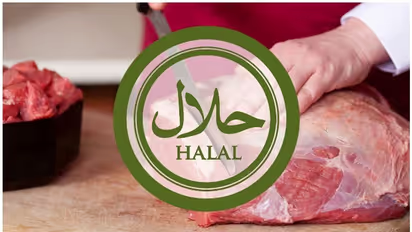Halal certification process explained step-wise

Synopsis
As the issue of religious polarisation is at its peak and now the issue over Halal meat and its products is being debated everyday in Karnataka, many companies still depend of Halal certification to export their products. Here we explain the process of Halal certification step-wise.
The row over Halal meat is yet to settle down as Hindu outfits continue to spar over Halal vs Jhatka meat. While the BJP ruled state remains mute spectators over the issue, the business houses exporting its products out of India still depend on Halal certification.
According to Mohammed Imran, Operations Head, Halal India, a private certification body says not just Muslim nations, countries like Thailand, Singapore, Malaysia and many other countries also are very particular about Halal due to the heavy tourist inflow and also due to food choice of Muslims population in the respective nations.
Halal certification process explained:
According to Halal India, the clients need to fill the application forms with the required documents as per rules.
A document kit consisting of all the documents from license to raw material and ingredients used will be shared with the Technical Assessment department or R&D department.
The team will prepare a pre-assessment report based on the desktop audit from the documents.
The auditing team takes over and will review and liaise with the manufacturer or client and fix an audit date and visit the site physically and do the complete audit checks mandatory according to the international accreditation standards.
Once the audit is done a report is prepared by the auditing team called the 'post-audit' report. This report will be compared with the pre-audit report and also be verified again. And then the samples to the labs partnered with various laboratories like Bureau Veritas, ITC and many more will be sent.
Once the report lab is collected, it will be sent to the 'Shariah' board for final approval and signature and then the certificate dispatched. The hard as well as soft copies of certificates will then be sent to clients from the backend team.
What is Halal?
Halal does not have any religious aspect to it, it simply means anything which is hygienic, safe, non–toxic and ethical for mankind to consume is known as Halal. Halal is an Arabic word which means permissible.
When it is for mankind, it can be food and beverages, cosmetics, pharma products, and many other halal services which can be experienced immaterial of race, caste, creed and colour.
Stay updated with the Breaking News Today and Latest News from across India and around the world. Get real-time updates, in-depth analysis, and comprehensive coverage of India News, World News, Indian Defence News, Kerala News, and Karnataka News. From politics to current affairs, follow every major story as it unfolds. Get real-time updates from IMD on major cities weather forecasts, including Rain alerts, Cyclone warnings, and temperature trends. Download the Asianet News Official App from the Android Play Store and iPhone App Store for accurate and timely news updates anytime, anywhere.